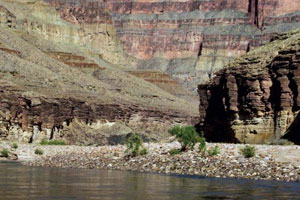Elijah was under no illusions. He knew full well that
his words would make him the target of Ahab’s wrath, and
the scapegoat for the tens of thousands who would suffer
as a result of the drought. Elijah had no fall-back plan
to make good his escape – but he appears never to have
doubted that help would be given him when it was most
needed.
| |
Then the word
of the Lord came to Elijah: “Leave here, turn
eastwards and hide in the ravine of Kerith, east
of the Jordan. You will drink from the brook,
and I have ordered the ravens to feed you
there.” So Elijah did what the Lord had told
him. He went to the Kerith ravine, east of the
Jordan, and stayed there.
(1 Kings 17:2-5) |
 |
|
serifdvd |
In the nick of time, God
did indeed speak to His servant – but what a strange
word it was! Withdraw to the back of beyond and be fed
by ravens beside a stream?? It can hardly be termed a
glamorous start to a preaching career – let alone a
fitting reward for a mission faithfully accomplished. In
the service of the Kingdom, however, obedience precedes
understanding.
True, we are wise to check and double-check every
leading we believe to be of God, but to hold back when
God has told us clearly to do something implies that we
do not trust Him. An irresolute mind opens the way for
all manner of doubts and misgivings. The powers of
darkness find it much harder to torment a steadfast and
resolute mind.(1)
What the Lord shows us will often fight against our
natural understanding. Since Cherith means a ‘drought,’
then surely this, of all brooks, must be prone to dry up
when the rains failed? How tempting it must have been to
move on and preach God’s word in other towns and
villages. Yet Elijah dared not disobey. If he ignored
this call to go into hiding, he would become just one
more victim of Ahab’s vicious campaign against the
followers of Yahweh.
Quite apart from the sheer necessity of hiding His
hunted servant, the Hebrew text provides us with a clue
as to God’s deeper purposes in telling Elijah8 to ‘hide’
by the brook Cherith. The word means to ‘absent oneself’
rather than just to seek concealment. To preach and pray
for others is to bring the peace and beauty of the Lord
into broken and disordered lives. To do so repeatedly is
exceedingly demanding work, and the Lord needed to fill
His servant afresh with His power.
Men may think that
the limelight is the place to do our most
important work, but prophets have a
responsibility not only to the affairs of this
world, but to matters beyond this world. |

serifdvd |
Scripture makes it plain that the
Lord accomplishes much of his best and most lasting work
in unseen places, through hidden faithfulness. There was
much the Lord could do in Elijah’s life only because He
had him on his own.
The Wisdom of God’s Foolishness
God’s wisdom is so incomparably higher than our own
that it often appears to be mere foolishness.(2) Just as
the Lord chose David ahead of his more apparently suited
brothers, so He continues to choose the most unlikely
people today to further His Kingdom, and to use those
are most aware of their weakness. Who but God would have
thought of sending a young oboe player to the walled
city of Hong Kong to minister to some of the world’s
most needy drug addicts?
Who else, for
that matter, could have kept Jackie To (Pullinger) faithful to her
calling through the long ‘hidden’ years during which she
saw no fruit from her ministry? Yet who today has not
heard of the amazing work God has done through her?
Instinctively, men fear weakness, and take out all
manner of insurance policies to protect themselves from
trouble. Scripture reveals a remarkably different
emphasis in which the obscure are exalted, and times of
trouble become the means by which the Lord fulfils His
purposes.(3) |
 |
|
morguefile |
The Welsh miner, Rees Howells, is a striking example of
one who yielded to this call to the hidden life. After
some years of fruitful ministry, God asked him to leave
his job as a miner and to withdraw from his popular
preaching ministry in order to spend more time alone
with Himself. It was a costly decision in every way.
Many failed to perceive the leading of the Spirit and
came to the utterly mistaken conclusion that he had
backslidden.
Concerning this period in his life, his biographer
wrote,
| |
At
first the world affected him, but in the end it
was he who affected the world.’(4) |
|
When the Lord released
him again to minister in public, thousands came to faith
through the missions he conducted in Africa. All could
then enjoy the fruit of his obedience. In the light of
the world-wide ministry the Lord entrusted to these
people, how grateful we can be that they did not lose
sight of their original calling, and give up during the
years of apparent fruitlessness. Beyond the seeming
waste and foolishness lay the Master’s hidden purposes.
I believe that many of us have not progressed into a
deeper maturity in the faith because we have not
sufficiently yielded ourselves to the Lord. We are still
at the stage of making bargains with God: ‘If You will
do this, then I will do that . . .’ Wisdom lies in
letting Him have His way, for He knows exactly what He
is planning to do.
If the thought of making such a complete surrender
appears daunting, then consider the alternative. Could
anything be more foolish than to hold back on the Lord
who has our very best interests at heart? The Lord never
takes anything from our lives without putting something
infinitely richer back in its place. May we be stripped
of our inclination to doubt whenever God calls ‘time’ on
something that has meant a lot to us.
|
Reflections |
|
| |
The eyes of the Lord range throughout the earth
to strengthen those whose hearts are fully
committed to Him . . . ‘
Who is the one who will devote himself to be
close to Me?’(5) |
|
Either from the Bible, or
from firsthand acquaintance, make a list of men and
women who have been called aside by God in order that He
could fulfil greater purposes through them at a later
date. What does this have to say about God’s priorities?
|
Selah |
 |
| |
Lord,
I long to be more in Your company.
Take me beyond the realm
of needing to be
needed,
and into a place of greater intimacy
with
Yourself.
Still the restlessness of my soul,
and lead me into a deeper intimacy
with You
in
the hidden places.
In Jesus’ name, Amen |
|
|
References
1 See James 1:6-8
2 1 Samuel 16:11-13, cf 1 Corinthians 1:18-29
3 Cf 1 Corinthians 2:2-3, 4:9-10; 2 Corinthians
1:8-9, 6:4, 11:30, 12:9-10
4 Rees Howells, Intercessor, Lutterworth Press
5 2 Chronicles 16:9, Jeremiah 30:21. Concerning
this call to deepen our devotional life, Richard
Foster’s book ‘Prayer – Finding the Heart’s True
Homeland’ is an outstanding introduction to the
contemplative life. (Hodder). So too is ‘The Imitation
of Christ’, by Thomas A Kempis, the best-selling
Christian book of all time after the Bible. (Highland
Books have produced a modern translation). |
|

